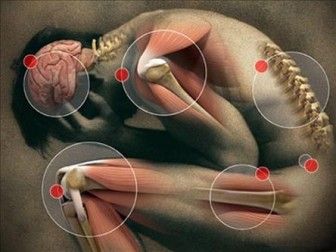Why Does the Human Body Experience Pain

Why Does the Human Body Experience Pain? 🤔
Pain is the body’s way of signaling that something is wrong. It serves as an alarm system, warning us of potential injury or underlying health issues. Here’s a more detailed look at the common causes of pain:
1. Injuries and Trauma
Physical damage to any part of the body can cause pain. This includes injuries from falls, sports, accidents, or any physical trauma. Muscles, bones, tendons, or skin injuries usually result in immediate pain.
2. Inflammation
Inflammation is the body’s response to infection or injury. When immune cells rush to the affected area, inflammation occurs, often accompanied by pain. Conditions like rheumatoid arthritis cause painful inflammation in the joints.
3. Nerve Damage and Neuropathic Pain
When nerves are damaged, compressed, or inflamed, neuropathic pain can result. This type of pain is often described as sharp, burning, or tingling. For instance, a herniated disc can press on nerve roots, causing pain in the back and legs.
4. Muscle Strain and Tension
Muscles can become strained or tense due to overuse, fatigue, stress, or poor posture. This type of pain is common in the neck, shoulders, and back, especially in people under prolonged stress. Lifestyle changes and exercise can help alleviate this pain.
5. Chronic Conditions
Certain conditions cause persistent or recurrent pain. Diseases like migraines, fibromyalgia, and chronic back pain are characterized by ongoing discomfort that can significantly impact quality of life, even without an obvious injury.
6. Organ Problems and Internal Pain
Pain can also arise from issues with internal organs. For example, gallstones can cause abdominal pain, kidney stones can lead to intense side pain, and heart problems might manifest as chest pain. Pancreatitis can cause upper abdominal pain.
7. Psychological Factors
Emotional stress, anxiety, and depression can exacerbate or even trigger physical pain. These psychological factors often manifest as headaches, neck pain, or back pain. Managing stress and seeking therapy can help reduce pain associated with these issues.
8. Nutritional Deficiencies and Dehydration
A lack of essential nutrients or dehydration can lead to muscle cramps, headaches, and general weakness. Deficiencies, particularly in magnesium and potassium, can cause muscle pain and discomfort.
Take Pain Seriously
Pain often indicates an underlying health issue. If your pain is persistent or severe, it’s important to consult a healthcare professional. Early diagnosis and appropriate treatment are key to addressing the root cause of pain effectively.
Listen to your body and don’t ignore your pain!
#Health #Pain #Body #PainCauses #HealthyLiving #StayInformed



